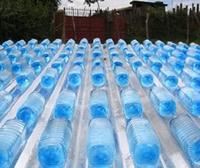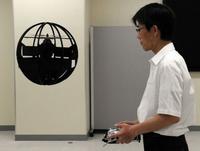-
London police use smartphones, social network to identify rioters

The rioters in London — and now, in other British cities — have been using Blackberries to outmaneuver the police; communicating via BlackBerry instant-message technology, as well as by social networking sites like Facebook and Twitter, the rioters repeatedly signaled fresh target areas to those caught up in the mayhem; RIM has now agreed to cooperate with Scotland Yard to turn over protestors using the service to coordinate their assaults; the police is also releasing CCTV images of the rioters to a group using face recognition technology to identify and condemn rioters; the police is also using Flickr, Tublr, and Twitter to spot and identify participants in the riots
-
-
Undergraduate student overcomes major hurdle to invisibility cloak
An undergraduate student has overcome a major hurdle in the development of invisibility cloaks by adding an optical device into their design which not only remains invisible itself, but also has the ability to slow down light; the innovation open up the possibility for a potential invisibility cloak wearer to move around amongst ever-changing backgrounds of a variety of colors
-
-
Towing icebergs to provide fresh water for parched regions

A third of the world’s population — more than two billion people — lives without access to clean drinking water, and studies show that the situation will only get worse; a French innovator has an idea: towing icebergs from the Greenland and Antarctica to regions most in need of fresh water; a computer simulation shows this solution to be viable and affordable
-
-
Solar-based method to provide safe water

A revolutionary low-cost technique that uses sunshine to provide safe drinking water; solar disinfection (SODIS) of drinking water is an effective way of preventing water-borne diseases such as cholera, dysentery or polio — especially important in developing countries, where safe drinking water is often a precious rarity
-
-
U Maryland students design record-breaking helicopter

University of Maryland students flew past a world record after their human-powered helicopter hovered more than twelve seconds inside a campus building; the team’s goal is to win the Sikorsky Prize, a $250,000 reward given by the American Helicopter Society; in order to win, a human-powered helicopter must fly at least thirty seconds, hover at least three meters above ground, and not drift outside a ten-meter square
-
-
DHS "pre-crime" detectors draw criticism
A plan by DHS officials to use automated machines to identify people before they commit a criminal or terrorist act is drawing sharp criticism from privacy advocates; DHS is currently developing intention detectors under the Future Attributer Screening Technology (FAST) program; the FAST security checkpoints are outfitted with a sophisticated suite of sensors that are designed to identify several physiological indicators like heart rate or the steadiness of a person’s gaze
-
-
Beachball-like observation UAV developed

A beach ball-size drone can fly down narrow alleys, hover on the spot, take off vertically, bounce along the ground like a soccer ball — all the time transmitting live images from a video camera; it can travel above traffic or spy on a target through a window — and can also be used in search and rescue in disaster zones, where it could fly through buildings and even up and down stairways
-
-
Innovative biosensor for rapid virus field tests
Relying on a novel DNA-based bio-chemo-physical conversion method, a new bio-detection device is able to detect harmful bacteria, such as E. coli, salmonella, and staphylococcus, on site, within thirty minutes; it can be adapted to cover such deadly viruses as SARS, H5N1 flu, and swine flu viruses; it can also be designed to monitor possible biological attack from anthrax, smallpox, cholera, and more
-
-
Making runways safer

Airplanes undergo significant stresses during take-off and landing, and parts often become detached, putting subsequent runway users at risk; until now, airport staff have had to monitor runways without technical assistance — an activity that is prone to errors; a new radar system is set to increase safety at airports
-
-
Market forces to help reduce emission, increase storage of CO2
New computer modeling work shows that by 2100, if society wants to limit carbon dioxide in the atmosphere to less than 40 percent higher than it is today, the lowest-cost option is to use every available means of reducing emissions — including using forests to store carbon
-
-
New coatings show promise as flame retardants

Ignition of soft furnishings account for about 5 percent of residential fires, and the consequences are disproportionately high; these fires are responsible for a third of fire-caused deaths of civilians and 11 percent of property losses due to fires in homes; NIST and Texas A&M researchers developed novel carbon nanofiber-filled coatings which outperformed conventional flame retardants by at least 160 percent and perhaps by as much as 1,130 percent
-
-
New device identifies unknown liquids instantly
Materials scientists and applied physicists have invented a new device that can instantly identify an unknown liquid; the 3D-nanostructured chip offers a litmus test for surface tension (and doubles as a carrier for secret messages); the researchers are currently developing more precisely calibrated chips and conducting field tests with government partners for applications in quality assurance and contaminant identification
-
-
Solving cold case by recovering old fingerprints
Researchers are developing a novel method for recovering old fingerprints using gold-antibody nanoparticles; the new fingerprinting method that could make it possible to recover previously unusable or undetected prints from old evidence and from surfaces long considered too difficult by crime scene investigators
-
-
Listening to the sound of bullets

ShotSpotter systems relies on a system of acoustic sensors to identify the location from which a shot has been fired; the alerts are immediately conveyed to police dispatchers, 911 operators, and sometimes to officers in the field via laptops in patrol cars; the system includes a computer program which displays a comprehensive bird’s-eye view of the area, marking the location of the incident with a red dot and indicating the time and number of rounds fired
-
-
Research inspires robotics design for medicine, military
A pathogen that attacks the small intestines of humans and animals is serving as the inspiration for developing robots that can fight disease and aid in military operations; ror 250 years, scientists have tried to understand how the microorganism is able to attach to a multitude of surfaces and swim in harsh environments — enabling it to infect many kinds of species while most parasites have specific hosts
-
More headlines
The long view
New Technology is Keeping the Skies Safe
DHS S&T Baggage, Cargo, and People Screening (BCP) Program develops state-of-the-art screening solutions to help secure airspace, communities, and borders
Factories First: Winning the Drone War Before It Starts
Wars are won by factories before they are won on the battlefield,Martin C. Feldmann writes, noting that the United States lacks the manufacturing depth for the coming drone age. Rectifying this situation “will take far more than procurement tweaks,” Feldmann writes. “It demands a national-level, wartime-scale industrial mobilization.”
How Artificial General Intelligence Could Affect the Rise and Fall of Nations
Visions for potential AGI futures: A new report from RAND aims to stimulate thinking among policymakers about possible impacts of the development of artificial general intelligence (AGI) on geopolitics and the world order.
Smaller Nuclear Reactors Spark Renewed Interest in a Once-Shunned Energy Source
In the past two years, half the states have taken action to promote nuclear power, from creating nuclear task forces to integrating nuclear into long-term energy plans.
Keeping the Lights on with Nuclear Waste: Radiochemistry Transforms Nuclear Waste into Strategic Materials
How UNLV radiochemistry is pioneering the future of energy in the Southwest by salvaging strategic materials from nuclear dumps –and making it safe.
Model Predicts Long-Term Effects of Nuclear Waste on Underground Disposal Systems
The simulations matched results from an underground lab experiment in Switzerland, suggesting modeling could be used to validate the safety of nuclear disposal sites.
